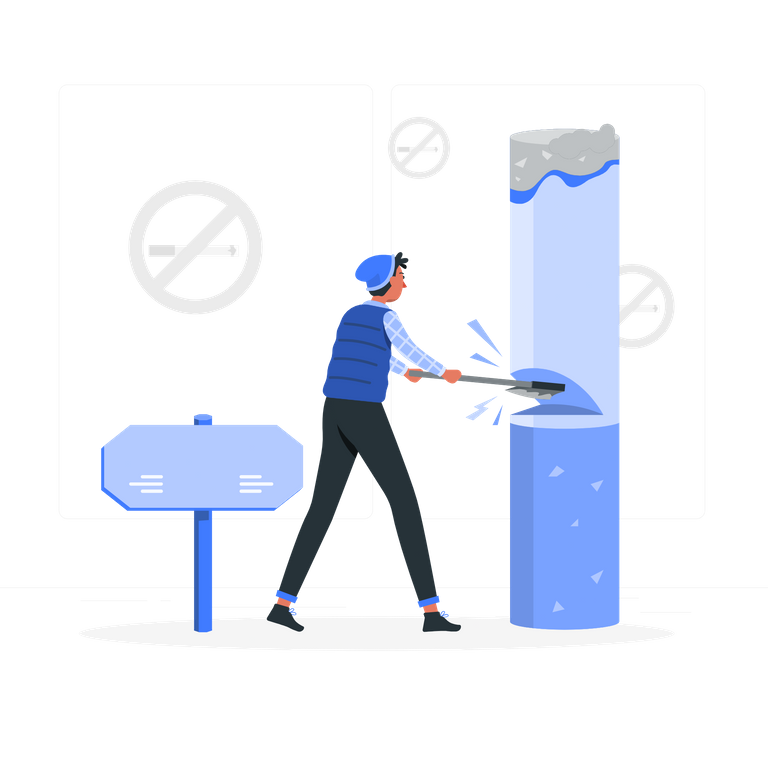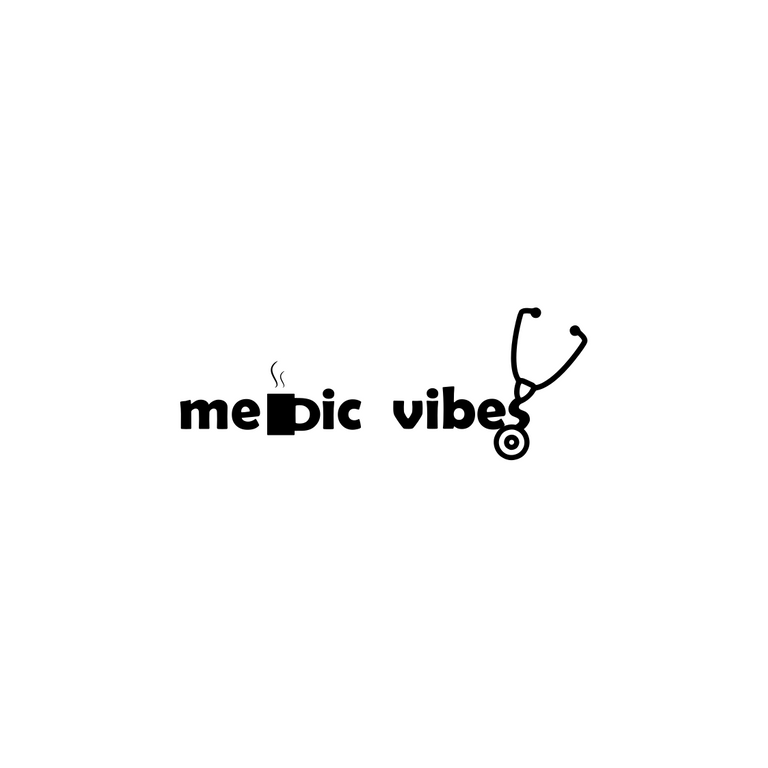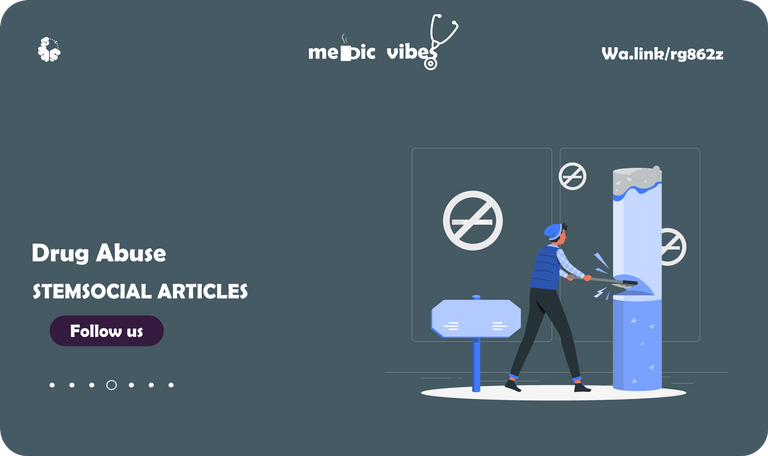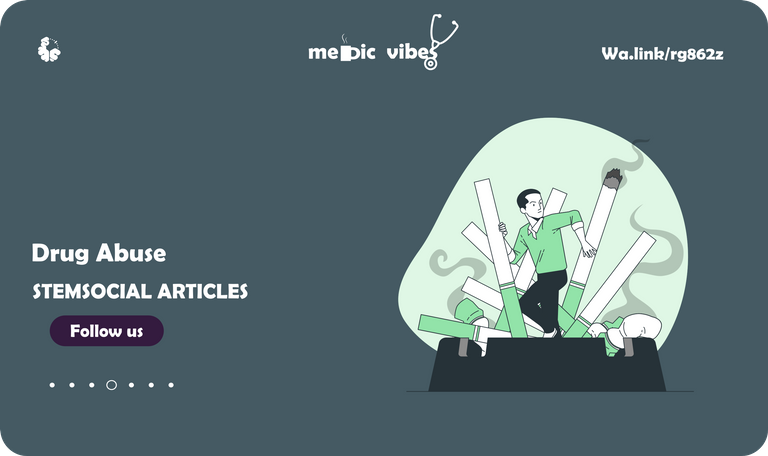Substance Abuse in Nigeria(Efforts)
In the last post, we saw how:
- Studies show risk of drug abuse higher among males, younger individuals, and those with certain family backgrounds or friends who abuse drugs.
- Drug abuse linked to psychiatric disorders, antisocial behavior, depression, suicide.
- Treatment for substance abuse varies and includes stages, specific drugs, and therapeutic alliance.
Welcome to Medic Vibes, where we discuss mental health disorders and make sense of them. Dr Ebingo Kigigha is a medical doctor (aspiring psychiatrist) and creative person (illustration and music). This has been our routine for four consecutive months. This month will be dedicated to substance abuse. In the first month, we discussed Depression, and in the subsequent month, anxiety. We just finished with Conduct disorders.
In this post, we are looking at A Nigerian Study on Substance Abuse. To learn more just keep scrolling down. You can also skip to the key point of the post if you which or go to the conclusion to get the summary.

Classification
There are four ways substance abuse can be classified for diagnostic purposes according to the Diagnostic and Statistical Manual (DSM-5). They are:
- Substance use disorders
- Substance intoxication
- Substance withdrawal
- Substance-induced mental disorder
When the term substance use disorder is used, they are referring to the specific substance's prolonged use. When making the diagnosis for any substance, there has to be a pattern of its effect on the patient such as a lack of functionality as shown by 12 months of use and its effect on work, school, or interpersonal relationships, use with physically hazardous effects, use despite these effects, and its exacerbation, tolerance, withdrawal, longer use, and bigger amounts, lack of success in achieving self-remission, missing important activities, use with knowledge of its effects, and the impulse to use the substance.

Substance Abuse in Nigeria(Efforts)

Image by storyset on Freepik
The National Drug Law Enforcement Agency in Nigeria has started putting in efforts to put an end to drug abuse and imprison those who are involved in this act. They have made programs to get the word out there about drug abuse and to help those who are in need of rehabilitation. Their efforts have been taken to the boundaries of the country to ensure drugs are not smuggled into the country. In 10 years of work, they have been able to confiscate 56,746 tons of drugs, and over 85,000 persons have been arrested, and over 16,000 were sent to prison.
The Federal government has been working with the Pharmacists Council of Nigeria to end the open sales of drugs. Without these efforts, it will be impossible to put an end to these problems permanently. They have also made laws against unlicensed sales.
The National Agency For Food and Drugs Administration and Control has banned the production, import, and sale of codeine within the country. Some companies had to be closed down for this very reason.
There are other agencies that have been put together by the Federal government such as the NDCMP or the National Drug Control Master Plan. The Federal government sees it as an agency that in the future will be better suited to handle issues concerning drug trafficking, manufacture, and farming in the country. In 2018, there were efforts to have a committee for addressing issues like this to the Federal government. Their responsibility was to advise the Federal government on such issues.
With all this put in place, there may still be a rise in drug abuse in the country because it is not yet taken as a matter of urgency by the politicians in power.
How can all this be addressed, the rise in prevalence in drug abuse and dependence? There is still a need to know those who are more vulnerable to drug abuse, as most studies capitalize on the fact that young people in universities and secondary schools tend to abuse drugs. There are also few studies that have been done in psychiatric institutions. The studies done to know the reasons for drug abuse are also very few.

Treatment
Brief interventions, such as a few weeks of detoxification, have limited impact on the outcome of individuals severely dependent on illicit opioids a few months later. On the other hand, treatments lasting at least 3 months have been shown to result in substantial reductions in illicit drug use, antisocial behaviors, and psychiatric distress among patients dependent on cocaine or heroin.
The time-in-treatment effect can be seen across different treatment modalities, including residential therapeutic communities and ambulatory methadone maintenance programs. However, a significant percentage of illicit drug users drop out or are dropped from treatment before they achieve significant benefits. Factors that can influence treatment outcomes include patient characteristics, events and conditions following treatment, and the range and intensity of services offered by the program.
Programs that offer more comprehensive services to patients with more severe psychiatric difficulties are more likely to be effective, and the skills of individual counselors and professionals can also play a role. These generalizations may not apply to programs dealing with individuals seeking treatment for alcohol, tobacco, or cannabis problems. In such cases, relatively brief periods of counseling can produce long-lasting reductions in drug use. Outcomes in programs for illicit drugs typically include measures of social functioning, employment, and criminal activity, as well as decreased drug-using behavior.
Treatment for individuals who have both severe mental illness (such as schizophrenia and schizoaffective disorders) and drug dependency is a challenging task for healthcare professionals. While some specialized facilities have been created that use both antipsychotic medication and community-based therapy, most addiction treatment centers have difficulty treating these patients.
Integrated treatment, where the same team can address both the psychiatric disorder and addiction, is more effective than treating them separately or in sequence. Parallel treatment (where a mental health and addiction program provide care at the same time) or sequential treatment (first treating either the addiction or the psychiatric disorder and then addressing the comorbid condition) is less effective.
Questions
- What did you learn about Substance abuse?
Conclusion
- Diagnosis of substance use disorder based on patterns of use.
- Nigeria is putting in efforts to combat drug abuse, trafficking, and addiction through multiple agencies and laws.
- Treatment of comorbidity in drug dependent mentally ill is challenging; integrated treatment is most effective.

References
- Kaplan-Sadocks-Comprehensive-Textbook-Psychiatry
- Page demarcations made with Inkscape.org
- Healthline
- NIMH
- WHO


No matter the benefits any substance might want to serve to us, we must be very careful of not abusing it